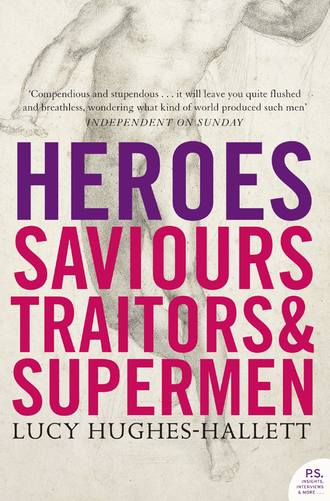
Полная версия
Heroes: Saviours, Traitors and Supermen
The shattered Hermae were not the only ominous sight in the streets of Athens at the time the Sicilian expedition sailed out with Alcibiades as one of its commanders. It was the feast of Adonis, and groups of women dressed as though in deep mourning were carrying effigies of the dead youth, the beautiful young man whom Venus had loved, through the streets, wailing as they went. The sombre processions were not much remarked upon at the time; but later, when the terrible outcome of the expedition was known, they were remembered with a kind of horrified awe as presages of what was to come and, more particularly, as reminders of the price to others of one man’s glory. If the campaign was to fulfil what Socrates had identified as being Alcibiades’ ambition, ‘to fill the mouths of all men with your name and power’, it would do so only at the cost of many other young men’s lives. It was a price the Athenians did not pay gladly. In one of the reversals frequent in the history of Athenian democracy the people first allowed themselves to be seduced by Alcibiades’ high talk of glorious conquest, and then, in a fit of self-disgust and revulsion, punished him for their own lapse into irrationality.
Alcibiades was not placed under arrest when the Salaminia arrived in Sicily. His opponents still feared provoking a mutiny and, as Plutarch remarked, Alcibiades ‘might very easily have brought this about if he had wished’. But he preferred the role of exile to that of rebel. Apparently docile, he agreed to follow the Salaminia home in his own ship. In southern Italy he put ashore, and vanished. The Athenian Assembly tried him in his absence and condemned him to death. His estate was confiscated. His name was inscribed on a stele set up on the Acropolis as a monument to his disgrace. All the priests and priestesses of Athens were ordered to call down curses on him. A reward of a talent (a considerable fortune) was offered to anyone who could bring him in, dead or alive. Three months after he had sailed from Athens with such pomp and splendour he was an outcast, a hunted man with a price on his head.
What Alcibiades did next has identified him, in the opinion of many latter-day historians, as an unprincipled scoundrel. When he heard of the death sentence pronounced against him he is reported to have said grimly: ‘I will show them I am still alive.’ Achilles turned traitor after his quarrel with Agamemnon, praying that his fellow Greeks should be beaten back to their ships. So, now, did Alcibiades. Before he even left Sicily, he had begun on his treachery. The Athenians had contacted an opposition group in the Sicilian city of Messina and arranged that they should open the gates to an Athenian attack. Alcibiades informed the pro-Spartan authorities in Messina of the plot. The attack was thwarted and the conspirators were put to death. From Italy Alcibiades crossed to the Peloponnese, and after first sending to ask for a guarantee of his safety, he made his way to Sparta. There he offered his services to his hosts, his native city’s archenemies. He urged them to intervene in Sicily (which they did, with devastating consequences for the Athenians). He also suggested that they do what the Athenians had for years been dreading that they might do – fortify the stronghold of Dekelea in the mountains north of Athens which commanded the route whereby the revenue from the silver mines, the tribute money from the offshore colonies, and, most importantly, food supplies, reached Athens. The Spartans acted on his advice. ‘It was this, more than any other single action,’ remarks Plutarch, ‘which wore down the resources of Athens, and finally ruined her.’
Such a betrayal, surely, could never be forgiven. Yet this was the same Alcibiades whom the Athenians were to welcome back seven years later with garlands and embraces and cries of joy, whom they crowned with a golden crown and elected general with supreme powers on both land and sea, the same Alcibiades of whom it was said that while he lived Athens could not die.
We live in a post-nationalist age, one in which Alcibiades’ disloyalty to his native city seems an absolute disqualification from the pantheon of heroism. But treason has not always been judged the action of the mean-spirited. Achilles despised the kind of status attainable by allegiance to a community of petty mortals and looked to Zeus for confirmation of his honour. Isolated in his tent, he stood by, implacably inactive, while the Trojans slew his compatriots. So, after the Athenians condemned him to death, Alcibiades, as far as his motives can be guessed at, acted for the rest of his life for himself alone, serving now Athens’ enemies, now Athens herself again, true only to himself and his limitless ambition. His Athenian contemporaries intermittently feared and distrusted him. Some hated him. But, traitor though he was, they did not despise him.
The relationship between the individual and the community in fifth-century Athens was an unstable one. The democratic assembly was terrifyingly fickle, inclined to turn savagely on its own servants. The generals who later replaced Alcibiades (after he was stripped of his command for the second time in 406 BC) were all put to death for alleged misconduct during a battle they had won for Athens. And just as the state could and did abandon its citizens, so citizens could quit the state. Both of the two great Athenian historians who wrote as contemporaries of Alcibiades, Thucydides and Xenophon, were to spend the majority of their adult lives away from the city, the former exiled for a military failure, the latter leaving of his own free will to serve first the Persian pretender Cyrus and subsequently the Spartans. Alcibiades’ defection would not have outraged his contemporaries to anything like the extent that it has shocked posterity.
Nor, given the influences to which he had been exposed, was it entirely unpredictable. The nurse who cared for him in his earliest childhood was a Spartan woman. His family had long had Spartan connections. One of his first political acts was to claim for himself the position of the Spartans’ representative in Athens, a job that had traditionally been performed by his forebears. When the Spartan delegates came to Athens to negotiate peace terms in 421 BC Alcibiades enjoyed privileged access to the most powerful of them, the ephor Endius, with whom he had family connections. The two states might be deadly enemies, but they were also near neighbours, and the links between upper-class families, in classical Greece as in medieval and early modern Europe, transcended national boundaries.
Besides, as an adolescent Alcibiades had been Socrates’ best-beloved disciple. Socrates was said to be the only person who could manage him, the only one whose opinion Alcibiades valued and whose advice he took. It is unclear how much influence the philosopher maintained over him once he was an adult, but unless Plato’s Symposium is entirely fictional (which is unlikely), they were still close friends in the year before the Sicilian expedition embarked. ‘What you have said’, Alcibiades tells Socrates in Plato’s account, ‘stirs us to the depths and casts a spell over us.’ Much later, when the philosopher was on trial for his life, his friends were at pains to point out that he could not be held responsible for the actions of his followers, but that he influenced their thinking seems indisputable. In The Birds Aristophanes describes a group of unpatriotically pro-Spartan youths as having been ‘socratified’. The jibe was amply justified. The philosopher’s most prominent disciples included not only the traitor Alcibiades but also several others who were passionate admirers of all things Spartan. Xenophon the historian, who was one of Socrates’ devoted followers, fought for the Spartans against Persia, accepted an estate in recognition of his services from the Spartan King Agesilaus, and lived happily on it for twenty years. When Sparta was defeated by the Thebans in 371 BC, he was obliged to leave, but he did not return to Athens. Critias, the collaborator who was set up by the Spartans as leader of the oligarchic regime of the Thirty Tyrants in Athens in 404 BC, was another of Socrates’ circle. And so of course was Plato, a nobleman who had relatives among the Thirty and whose ideal state, as described in the Republic, has a constitution that resembles that of Sparta far more closely than the Athenian one. It has been argued that when the restored Athenian democracy accused Socrates of ‘corrupting the youth’, and put him to death for it, the charge had a precise political meaning. He was being accused of being a Spartan sympathizer. The heroic stand he made at his trial, which has earned him the admiration of generations of libertarians and defenders of free speech and free enquiry, was made, if this theory is correct, in assertion of his right to commend one of the most repressive and secretive regimes in recorded history.
Sparta is the classical model for all subsequent totalitarian states, just as Athens is for democracies. It was a warrior society, dedicated with grim exclusivity to its own preservation and aggrandisement. The Spartans were a Dorian people who had invaded the Peloponnese from the north and had reduced the indigenous population, known as Helots, to a state of serfdom. The Helots had not submitted tamely. Their repeated uprisings were brutally suppressed. New ephors, on taking office, routinely declared war on them ‘in order that there might be no impiety in slaying them’. The state maintained a corps of Helot killers whose operations Plutarch describes: ‘They would be armed with daggers and supplied with basic rations, but nothing else … At night they came down onto the roads and, if they found a Helot, would cut his throat.’ Sparta’s much admired stability was guaranteed only by the omnipresence within it of violence and sudden death.
The Helots were obliged to provide food for the master race. The Spartans, thus freed from the labour of providing for themselves, were able to devote themselves single-mindedly to the business of warfare. ‘The Spartans are, of all men, those who admire poetry and poetic glory least,’ noted Pausanias. ‘They did not understand how to be at leisure’, wrote Aristotle, ‘and never engaged in any kind of training higher than training for war.’
It was forbidden for any Spartan to travel abroad except for purposes of conquest and foreigners were not made welcome, for Lycurgus, the Spartans’ mythical lawgiver, had wished the society he created should remain permanently intact and unchanged and ‘along with strange people strange doctrines must come in’. Trade was virtually non-existent, each citizen living off the produce of his own allotted plot of land. Lycurgus had forbidden luxury of all sorts. The staple Spartan food was a black broth famous throughout Greece for its nastiness. Spartan houses were all identical, and so crudely built that, according to a patronizing Athenian joke, a Spartan visiting Corinth was astonished to see wooden planks and asked whether the trees in that region had square trunks. Spartan dress was austerely simple. Even Spartan speech was limited and deliberately brusque. The people maintained a ‘general habit of silence’, a ‘laconicism’ (the word means simply ‘Spartan’), which combined the caution of those whose rigidly conservative, authoritarian state permitted them no political voice and the dumbness of those whose every personal response was suppressed or put to public use.
The state was all-encompassing. Spartans, according to Plutarch, had ‘neither the time nor the ability to live for themselves; but like bees they were to make themselves integral parts of the whole community’. The city was like a military encampment, where each person had allotted duties. All personal relationships were subordinated to that between the individual and the state. Male babies were inspected by the elders at birth. If they were not perfectly healthy they were thrown into a ravine. Those who passed muster were cared for by their parents until the age of seven, when they entered the school, a vast boot camp whose curriculum consisted almost entirely of gymnastics, where they learnt obedience to discipline, indifference to pain and the rigid suppression of private emotion.
The boys were systematically underfed and encouraged to steal to satisfy their perpetual hunger, but if they were caught in the act they were ruthlessly flogged. The young men lived in all-male dormitories but they were permitted to marry. A bride was abducted by force from her family home. Her hair was cropped back to her scalp by a ‘bridesmaid’, who then stripped her and left her lying alone on the floor of a darkened room to await her husband, who came late at night and stayed only long enough to perform his reproductive duty before returning to the men’s house. The couple’s subsequent encounters would be equally swift and furtive, and always nocturnal, so that a woman might give birth to several children before seeing her husband’s face. All men, of whatever age, took their meals in the communal mess (women ate separately, and were rationed to about one-sixth the quantity of food allowed to their menfolk). Men who refused to marry were punished and publicly shamed. Husbands who failed to impregnate their wives were pressured into inviting other men to do so. Jealousy was despised, along with all other manifestations of strong personal feeling. A mother who expressed contempt for a cowardly son was especially esteemed. Sparta was a place of throttled emotion, of willed dumbness and of furtive violence. ‘When the Spartans kill,’ wrote Herodotus, ‘they do so at night.’
This place of darkness and suppression, however, was widely admired even by its enemies. Socrates joked about the fashionable Athenian Spartophiles who wore short tunics and leather bands around their legs and mutilated their ears in the Spartan style. Spartans were praised for their frugality and their physical fitness, for the fortitude with which they bore pain, for their indifference to all forms of pleasure and their readiness to sacrifice themselves for the common good. To many Athenians they seemed, not enviable of course, but admirable: models of ascetic virtue, time travellers from a simpler but more dignified age. The austerity of their lifestyle made an aesthetic appeal even to those who would not themselves have wished to drink black broth. The authoritarianism of their rulers was insidiously seductive to those weary of the endless argument and counter-argument of the democratic process. Pindar wrote in praise of Sparta, its venerable council of elders, its young men’s conquering spears. And Plato, while overtly rejecting the Spartan system of government as being debased, incorporated many Spartan institutions and Spartan values into his ideal Republic, thus ensuring that Lycurgus’ programme for converting an individual into a useful component of the state has become intrinsic to Western ideals of manliness, of good citizenship, and of heroic virtue.
In Sparta Alcibiades was to describe Athenian democracy as ‘a system which is generally recognized as absurd’; and although he was undoubtedly attempting to curry favour with his anti-Athenian audience, it is also possible that he spoke from the heart. He had proved a brilliant manipulator of the democratic Athenian Assembly, with powers of persuasion equal to those of the demagogues he despised; but once the Assembly had turned against him he would have had strong personal reasons to reject, not only that particular gathering, but the political system of which it was the foremost example. As an aristocrat he may have found the oligarchic Spartan system congenial. As a young and famously beautiful military commander he must have responded to the Spartan cult of the warrior: ‘In time of war they relaxed the severity of the young men’s discipline and permitted them to beautify their hair and ornament their arms and clothing, rejoicing to see them, like horses, prance and neigh for the contest.’ He had felt in Athens what it was like to be at the mercy of people he considered his inferiors. He had been condemned by his own city for reasons that probably seemed to him pettifogging and stupid. Sparta may have seemed to him a home more fit for heroes.
Certainly it suited him to give his hosts that impression. He arrived in Sparta a penniless fugitive whose life depended on his winning the protection of his former enemies. Never again would he dazzle and intimidate in his youthful role of spoilt, swaggering dandy. In Athens, he had made a mock of public opinion. In Sparta, he was tactful, accommodating, charming. In Athens, he glittered like Achilles: in Sparta he showed that he could bend and change like Odysseus, Homer’s ‘man of twists and turns’. Achilles is absolutely self-consistent, totally transparent. He says he hates the man ‘who says one thing but hides another in his heart’ as he hates the Gates of Death. Odysseus says the same thing in almost identical words, but he says it in the course of a speech we know to be a concatenation of lies. He is a diplomat and intriguer, a master of disguise and dissimulation. Alcibiades was like him. He was a chameleon, a brilliant role-player. He possessed, says Plutarch, ‘one special gift which surpassed all the rest and served to attach men to him, namely that he could assimilate and adapt himself to the pursuits and the manner of living of others’.
He was an outcast now, and those deprived of their rooted identity are freed to reinvent themselves. The second-century theologian Justin Martyr described the lineage of Cain, those outsiders of Hebrew legend, as shape-shifters who could become at will birds, serpents, or quadrupeds. Alcibiades, an accursed exile like Cain, had the same protean gift, mark both of his untrustworthiness and his uncanny brilliance. In Athens his lifestyle had been luxurious to the point of decadence. Sailing to Sicily, he astonished his peers by having part of the deck of his trireme cut away so that he could sling up a hammock instead of sleeping, as all his compatriots, however exalted, did, wrapped in his cloak on the wooden deck. Now he became an ascetic. ‘By adopting Spartan customs in his everyday life he captivated the people and brought them under his spell.’ He grew his hair long in the Spartan fashion, took cold baths and ate coarse bread with the notorious black broth. (Ironically, this play-acting won him the accolade of being compared with the hero who was never anything but himself: ‘In Sparta, so far as all the externals went, one could say of him “This is no son of Achilles, but Achilles himself”.’) A marked man, he could no longer afford the self-indulgence of spontaneity. For the rest of his life, for all the glory and acclaim that still lay before him, he would have to please his audience, to mind his manners and watch his back.
He had to present himself to his new masters as something more than a renegade with an exhaustible fund of useful information. He could probably, had he been content to live a modest and private life, have bought himself sanctuary at the price of a few minor betrayals, but the restless, self-castigating ambition that Socrates had identified in him made such a solution to his problems inconceivable. When he arrived in Sparta in the winter of 415–414 BC he had yet to score any notable military successes. Deprived as he was of his social position, without his wealth, without an army, the only way he could win a role consonant with the ‘love of distinction and desire for fame’ that drove him all his life was to project an image of himself as a superman capable of accomplishing mighty deeds unaided. In Sparta he began the creation of that image.
He had a quick eye for the main chance. Odysseus is ‘never at a loss’ and Thomas Carlyle was to define a hero as ‘a man with an almost mythical awareness of what needed to be done’. Alcibiades was one such. The philosopher Theophrastus, who lived a century after him, thought that he ‘possessed in a higher degree than any of his contemporaries the faculty of discerning and grasping what was required in a given situation’. Delegations arrived in Sparta from Sicily asking for help against the Athenians. Alcibiades seized his opportunity. He spoke in the Sicilians’ support, using the occasion to make his formal entry into Spartan public life. His speech, as reported by Thucydides, is a brilliant exercise in self-justification and self-aggrandisement. In it he publicly declares, for the first time, a tremendous programme of conquest and colonization of which the Sicilian expedition was to have been only the beginning. From Sicily, he told the Spartans, he would have led the Athenians on to Italy and, that territory once conquered, would have launched an attack on Carthage and its empire. Then, with all the might of their new western conquests to draw on, the Athenians would have returned to crush the Peloponnesians, to emerge finally as masters of the entire Mediterranean world.
Probably Alcibiades had entertained such intentions: they are entirely consonant with his well-attested ambition. But it is unlikely that such a grand design ever existed outside of his imagination, and inconceivable that Nicias would have consented to it. When Alcibiades told the Spartan Assembly that ‘The generals who are left will, if they can, continue just the same to carry out these plans’ he was certainly lying. But the lie went undetected. The Spartans were persuaded. They decided to intervene in Sicily. And from then onwards, in their eyes and in posterity’s, the audacity and grandeur of those tremendous projected conquests attached themselves to Alcibiades, lending him the aura of a great man; one who, had he not been thwarted by his ungrateful compatriots, might have become, five years before Alexander of Macedon was born, a world-conquering Greek. The modern historian Donald Kagan pays tribute to his performance on this occasion: ‘One can only marvel at his boldness, his imagination, his shrewd psychological understanding, and the size of his bluff.’
For the next two and a half years, Alcibiades lived in Sparta. Plutarch speaks pityingly of him wandering aimlessly about the city; but there is no evidence that he was humiliated by his hosts. The only story we have about his sojourn in Sparta is that of his liaison with Queen Timea, wife of Agis, one of Sparta’s two kings. Agis was abstaining from sex after an earthquake, which he took to be a divine warning, had interrupted his love-making with Timea. He was absent on campaign when a second earthquake shook the palace and a man was seen escaping from the Queen’s bedroom. That man, according to ancient gossip, was Alcibiades. Nine months later Timea gave birth to a son. The story may be scurrilous (Agis’ other heirs would have had a motive for alleging the baby was illegitimate), but it is perfectly credible. Alcibiades was as attractive as ever and unused to sexual continence. The child was later barred from succession. When challenged about his alleged paternity Alcibiades is reported as saying, with his characteristic arrogance, ‘that he had not done this as a mere insult, nor simply to gratify his appetite, but to ensure that his descendants would one day rule over the Spartans’.
While Alcibiades dallied in Sparta the Athenians’ campaign in Sicily ended in horror. The fleet was annihilated. The entire army was either slaughtered or enslaved. The venture for which Alcibiades was largely responsible, and which he had envisioned as the first phase of a glorious series of conquests, left Athens crippled, without money, without ships, without fighting men. At once her colonies began to contemplate secession.
During the winter of 413–412 BC, two years after Alcibiades had arrived in Sparta, the Spartans were twice approached by rebellious oligarchic factions within Athenian colonies asking for support. In both cases the rebels already had Persian backing. The Great King’s satraps in the region were eager to exploit any weakness within the Athenian empire. Alcibiades was among those who advocated sending a fleet to support the rebels on the island of Chios. He must, after two years’ stagnation, have been craving action and the chance to cut a brilliant dash. King Agis, who had presumably heard the stories in circulation about Queen Timea’s surprising pregnancy, was by now openly hostile towards him. Unless he could do the Spartans some signal service Sparta would not be a safe refuge for much longer. He embarked on the second phase of his self-mythologizing. He personally, and he alone, he told the ephors, would be able to break Athens’ hold on the cities of the eastern Mediterranean. ‘He said he would easily persuade the cities to revolt by informing them of the weakness of Athens and of the active policy of Sparta; and they would regard his evidence as being particularly reliable.’







